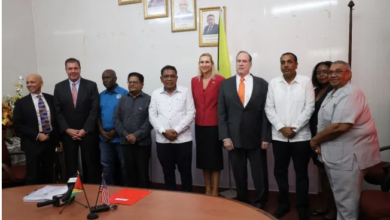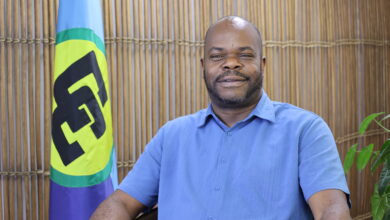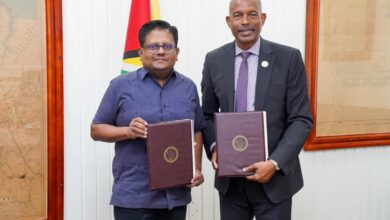His Excellency the President of Guyana
The Hon. Prime Minister of Guyana
The Deputy Prime Minister of the Bahamas
Cabinet Ministers of Guyana and other Honourable Ministers of Government of the Caribbean Community
Members of the Diplomatic Corps
Mr. James Moss-Solomon, Chairman, and other Members of the Task Force
Members of the Private Sector
Deputy Secretary-General and other members of the Executive Management of the CARICOM Secretariat
Other Distinguished Participants
Representatives of the Media
Ladies and Gentlemen
I join the Chairman of the Task Force in extending a warm welcome to you all. I also wish to extend a special welcome to the representatives of Argentina and Brazil. I had the honour and pleasure to be invited last week to their countries.
Today, we are beginning an exercise which can have profound effects on our Region. A little more than one year ago today, on 2 June 2007, the Caribbean Community with the help of its International Development Partners staged an Agricultural Donor’s Conference in Port of Spain, Trinidad. At the end of that Conference, the Minister of Agriculture of Guyana, the Honourable Robert Persaud, in charting the way forward, suggested action at five levels. In outlining the last of the five, he said:
“Finally, but running concurrently with the practical steps outlined before, is the Planning and Convening of the Investment Forum. Ensuring public/private partnerships and private/private partnerships are essential. Therefore we propose an Investment Forum that will allow us to take the necessary action in this regard.
This Investment Forum will bring together all the sector’s stakeholders private sector, farmers’ organizations, regional and national financing institutions, with every actor that plays a part in the commodity chain from research and innovation, production, processing through marketing to sales and final consumption as well as impact on health and nutrition.”
He went on to add that “the Forum should aim to have as one of its main outcomes indications of the level of financial contributions and the specific sector or cluster of issues and projects to which in principle, GOVERNMENTS, DONORS and INVESTORS will commit resources. By this stage a matching of needs and resources would have been accomplished.”
Ladies and Gentlemen, if you did not know before what this CARICOM Regional Agriculture Investment Forum was all about, it has been laid clearly before you by the Statement of the Honourable Minister.
The timing for this Forum is most propitious. Agriculture is now a global preoccupation – whether it be due to the increasing price for food, or the unavailability of specific basic commodities, or to the perception that the current global situation is being exploited – and exploited not in the best sense of that word.
Fortunately, the Caribbean Community had already begun to focus on Agriculture even before the current situation of rising prices and scarcity of food supplies. The issue has been a critical item on the Agenda of Meetings of the Conference of Heads of Government in recent years and the Lead Head of Government with responsibility for Agriculture, His Excellency President Bharrat Jagdeo, has been giving dedicated attention to ensuring and facilitating increased commitment to removing the key binding constraints to the development and competitiveness of agriculture in our Community.
This Investment Forum is seeking to address one of these key constraints, that is lack of, or certainly inadequacy of, investment in this sector. There have been market-driven investments, more obviously in the medium-to-large scale operations, such as:
- flour mill expansion, paper and ethanol from sugar cane in Trinidad and other Member States of the Region;
- poultry in Barbados, Guyana, Jamaica, T&T;
- anthurium research and expanded production in T&T;
- greenhouse production, cotton and bio-fuels development Barbados and Jamaica; and
- innovative marketing of bananas in the OECS
There is also investment occurring among the micro and small-scale agri-food sector in all countries, especially in the,
- small-scale food, snack and juice processing;
- green house production;
- food retailing; and
- initiation of organic production in most countries.
But unfortunately, such investments are all too few and hence, have had limited impact on stemming the decline in regional agriculture. The primary objective of CARICOM’s Agricultural Policy as stated in Article 56 of the Revised Treaty, is “to effect a fundamental transformation of the agricultural sector of the Community” and to do so by diversifying agricultural production, intensifying agro-industrial development, expanding agri-business and generally conducting agricultural production on a market-oriented, internationally competitive and environmentally sound basis.
But investment is central to the achievement of this objective. Unfortunately, available data shows the less dynamic nature of agri-food investments when compared with other sectors, due in part, to a generally unfavourable investment climate for agriculture relative to other economic sectors. This is what we need to change.
In his address to the 2007 Donors' Conference, President Jagdeo concluded that while most of the national/regional constraints are within the technical competence of the Region to address, resource limitations increase the complexity of the responses to the globally imposed challenges.
There is therefore the need for attracting private sector investment as a complement to public sector actions to enhance the enabling environment for sustainable agriculture. This was the position he tabled at the 2007 Conference. This remains the position which we seek to change today.
Ladies and Gentlemen, access to external markets is also a major consideration for attracting investors. Such access relates to legal, physical and institutional affairs. All of these are relevant in regard to the various trade and economic Agreements the Community has entered into, including the Economic Partnership Agreement with the European Union.
Other relevant aspects relate to some of the other Key Binding Constraints of the Jagdeo Initiative and point to the need for an enabling domestic support regime which must include a well defined and managed regime of investment incentives.
At the regional level, under the CSME framework, CARICOM is committed to a Community Investment Policy as outlined in Article 68 of the Revised Treaty of Chaguaramas. This policy seeks to achieve the following:
- sound national macroeconomic policies;
- a harmonised system of investment incentives;
- stable industrial relations;
- appropriate financial institutions and arrangements;
- supportive legal and social infrastructure; and
- modernisation of the role of public authorities.
Virtually all CARICOM Member States have at the national level an Investment Regime to support the policy of investment-driven private-sector growth in key economic sectors that include agriculture. Most Member States also have Trade and Investment Promotion Agencies that are also in charge of promoting investments in agriculture and agri-business.
The CSME framework, however, provides within its 12 small Member States, a Single Economic Space providing for free movement of skills, capital, inputs and raw materials, as well as services. It also provides for production integration in various forms of cooperation among enterprises, be it for complementary production and collaboration or for a single economic enterprise producing in more than one Member State. Little wonder then that the Single Development Vision, adopted by the Heads of Government of CARICOM, identified agriculture as one of the main drivers of growth. The support policy, institutions and mechanisms in the Region include:
- The regional transformation Programme for Agriculture (RTP), which is Treaty based in Chapter Four of the Revised Treaty;
- The research and development framework and the accompanying Institutional Arrangement, such as the Caribbean Agricultural Research and Development Institute (CARDI);
- The Fisheries Development Programme and the accompanying Institutional Arrangement – Caribbean Regional Fisheries Mechanism (CRFM); and
- The Strategy inherent in the Jagdeo Initiative to alleviate key binding constraints of which the Investment Forum is an intervention seeking to enhance the implementation of the RTP as a regional strategy in agriculture.
There is no doubt that the current global and regional environment is probably the best opportunity agriculture has had for a very long time to plant itself firmly among the higher earning investment possibilities. It is our hope therefore and indeed our expectation that this Forum could lead to the realisation of some of the possible benefits from a re-energised agriculture sector – increased production, trade and, above all, food security in this era of global food scarcity and rising food prices.
This is our hope, this is our objective; this is our commitment and I hope we can say this is our achievement.
I thank you.





